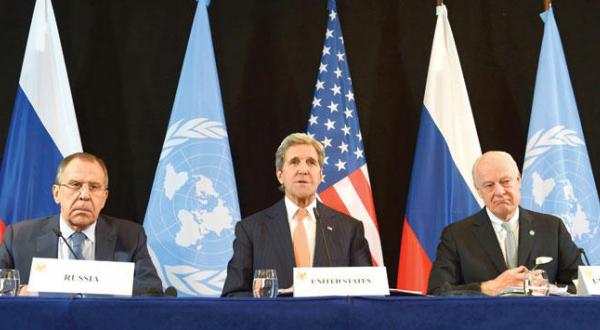
Russian Foreign Minister Sergey Lavrov, US Secretary of State John Kerry and UN special envoy on Syria Staffan de Mistura (L-R) hold a press conference following a meeting of the International Syrian Support Group (ISSG) on February 11, 2016 in Munich, Germany.
Munich, Beirut- After talks in Munich, Germany, the major world powers in the Syrian war have agreed on Friday to bring about “cessation of hostilities”, which will allow humanitarian aid to be sent to besieged Syrian towns and cities, and the establishment of humanitarian task force .
The 17-member International Syria Support Group (ISSG) also agreed to accelerate and expand aid deliveries.
The meeting included the key players America and Russia, and was aimed at re-initiating the Geneva peace talks which collapsed recently after Russia had stepped up its support of a major Syrian offensive against opposition forces in Aleppo.
Moreover, a communique was released following the meeting which declared that, “Humanitarian access to these most urgent areas will be a first step toward full, sustained and unimpeded access throughout the country.”
“What we need to see in the next few days are actions on the ground,” said U.S. Secretary of State John Kerry.
“Ultimately the end of this conflict will only come when the parties agree on a plan for a political transition,” added Kerry.
Russia’s Foreign Minister, Sergei Lavrov, said that his country will not stop its air attacks across Syria. He added that any cessation of hostilities will not include halting attacks against the jihadis of al-Nusra and ISIS.
Following the talks in Munich, a United Nations-backed task force met on quickly delivering aid to besieged towns and war-weary civilians in hard-to-reach areas across the country.
The task force held its initial meeting at the UN headquarters in Geneva less than 24 hours after it was by the ISSG, the group that has been working since November to secure a broader ceasefire and Syrian political negotiations and is comprised of the Arab League, the European Union, the United Nations, and 17 countries, including the United States and Russia.
In order to accelerate the urgent delivery of humanitarian aid, sustained delivery of assistance is expected to begin this week to besieged areas where civilians are in desperate need of assistance. Humanitarian access to these most urgent areas will be a first step toward full, sustained, and unimpeded access throughout the country.
“Once we get clearance by concerned parties, the UN and its humanitarian partners will be able to reach the civilians in need within the coming days,” Special Envoy for Syria, Staffan de Mistura said.
“Next week, we plan to have a second meeting of this task force, in order to assess the progress made, and maintain the pressure for incremental and unimpeded aid deliveries,” he explained.
